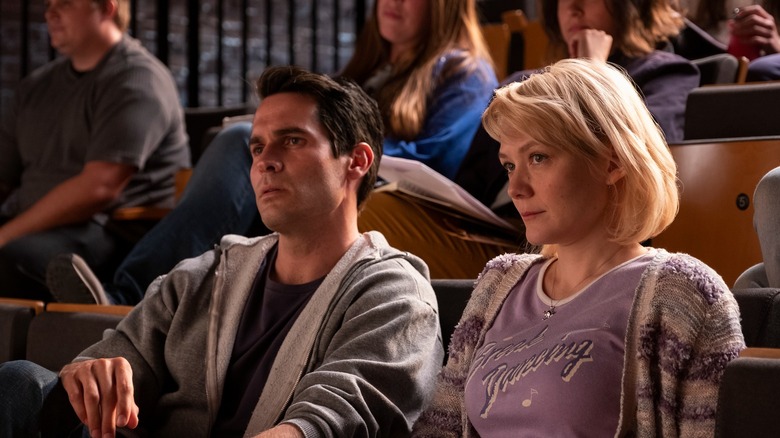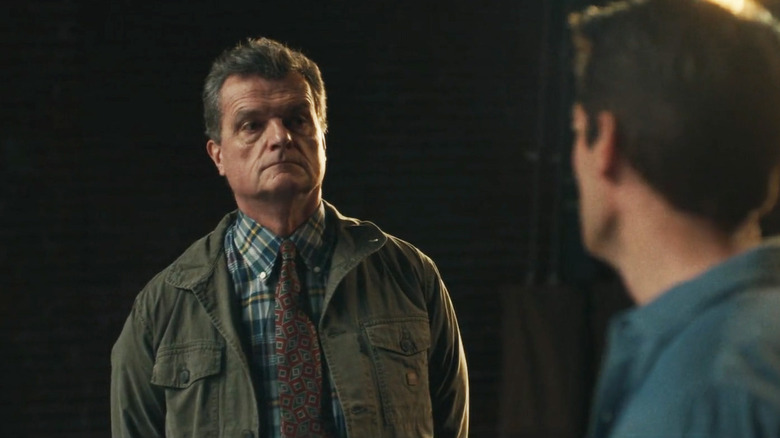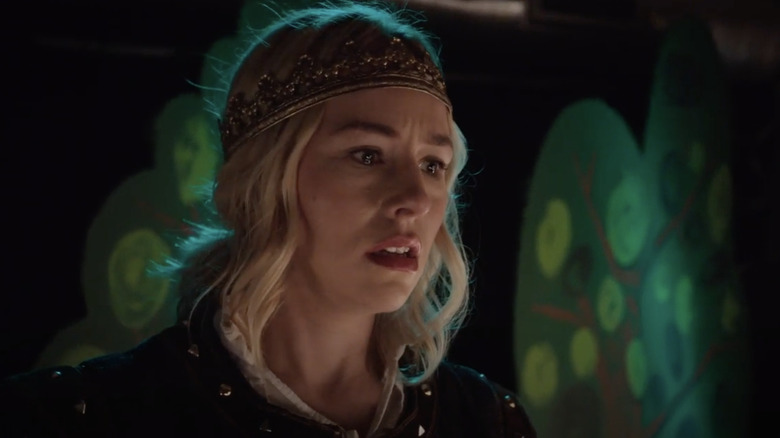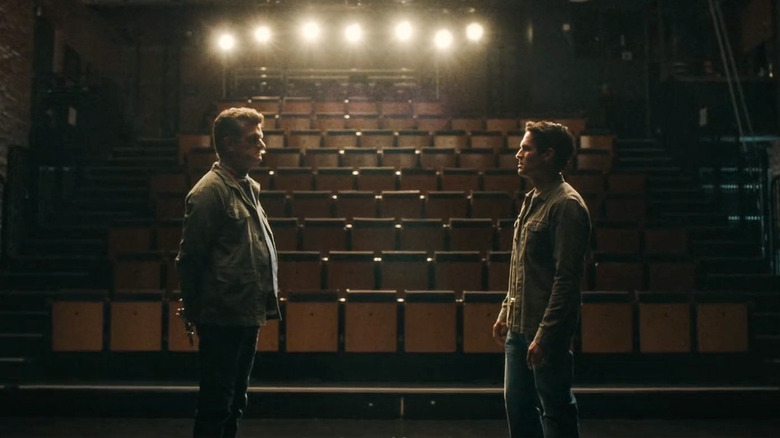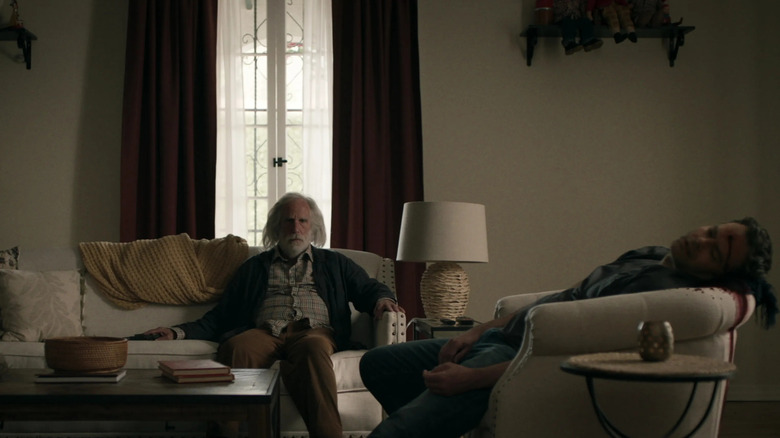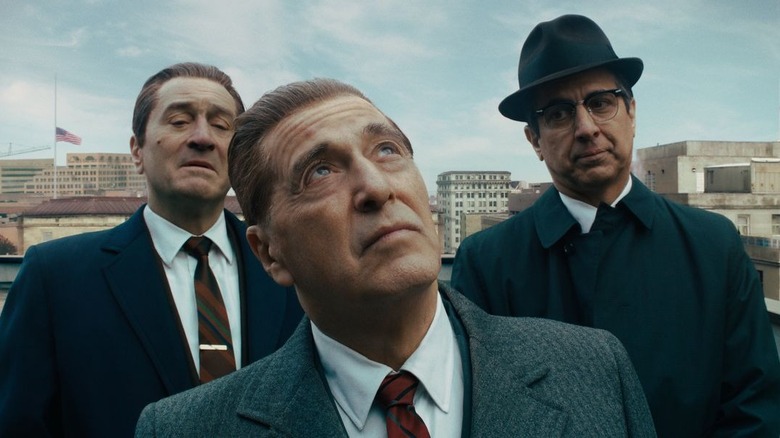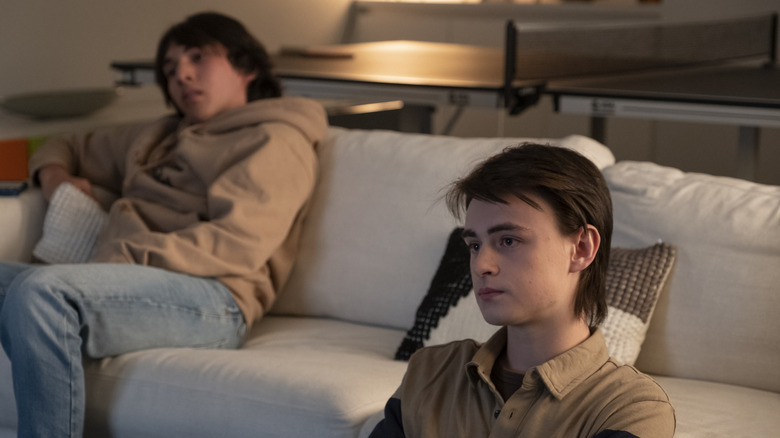Everything The Mask Collector Changes About Barry's Story
This article contains spoilers for the "Barry" series finale.
Hollywood and the truth aren't on speaking terms; it's a business founded on make-believe, after all. That's why it's the perfect setting for "Barry." I've written before that the series questions whether people can truly change, and its answer is that most settle for just pretending to be somebody else. Reckoning with the truth can be hard, and the series' epilogue shows how yet another comforting lie won out over reality.
The last scene of the series is John Berkman (Jaeden Martell), the teenage son of Barry (Bill Hader) and Sally (Sarah Goldberg), watching "The Mask Collector" — a highly inaccurate, sensationalized version of his father's life and how it intertwined with the life of acting teacher Gene Cousineau (Henry Winkler). "Barry" has always had a satirical outlook on the entertainment industry, and "The Mask Collector" — an overt critique of the true-crime industrial complex — is the cherry on top.
It also shows how the characters/events we've spent four seasons watching were perceived by the public. The story as depicted in the film is highly streamlined with several key players left out altogether. "The Mask Collector" turns Barry from a temperamental murderer to a wayward hero, Sally from an ambitious and self-driven artist to a white-bread love interest, and Gene from a flawed but comparatively innocent man into a criminal mastermind.
Let's dive into the specifics of all this film gets comically wrong about the Berkman/Cousineau case.
The bad beginning
"The Mask Collector" opens with Barry (played by Jim Cummings) leaving a bus with a bag on his back and then noticing Cousineau's theater. This, coupled with voiceover narration, implies that Barry arrived in Los Angeles and started acting immediately after his return from Afghanistan. By the time Barry met Sally and Cousineau, he'd been back in the U.S. for a while working as a hitman out of Cleveland, Ohio. The film also omits his "manager," Monroe Fuches (Stephen Root), who got Barry his "jobs" — including the one that brought him to Hollywood.
Instead, the only mentor figure in Barry's life is Cousineau, played by Michael Cumpsty, who retains his British accent for the part even though the real Cousineau is American. He and Barry's first meeting is also fictionalized, since Barry actually stumbled into a class while stalking one of Cousineau's students, Ryan Madison (Tyler Jacob Moore). Madison had slept with the wife of Chechen mob boss Goran Pazar (Glenn Fleshler) and so the latter hired Barry to kill him. The unknowing Madison quickly befriended Barry and planted the seed of acting in his head. Barry only convinced Cousineau to be his teacher a short while later by confessing his murders and a desire to change — which Cousineau misinterpreted as an improvised monologue.
Messing up the timeline
"The Mask Collector" then moves on to Barry performing the "Tomorrow" soliloquy from "Macbeth" in front of the class, drawing on his time in combat to add pathos. In doing so, he makes Cousineau proud and catches Sally's (Louisa Krause) eye.
This scene combines two distinct workshops of Cousineau's acting class: their Shakespeare festival in season 1 (where Sally performed the "Macbeth" monologue, not Barry), and the self-authored monologues about their painful memories in season 2. Barry and Sally were also already acquainted before either of these. In fact, everything about Sally is omitted: her headlining a production of "The Front Page" with Barry (under his also-absent stage name "Barry Block"), her time show running the streaming series "Joplin" for BanShe, and her break-up with Barry before his arrest.
In the next scene, Barry walks into Cousineau's office, where his teacher and Ryan Madison are meeting with Chechen mobsters. This is followed by Det. Moss (Kimberly Hebert Gregory) announcing Madison's murder to the rest of the class. The timeline here is totally distorted; while Madison was murdered by the Chechen mob (and then pinned as an associate of them), it happened well before the "Macbeth" performance. Cousineau also had no involvement with the mob — a connection was inferred because Barry hid the money he got from them at the theater, and it was later found by Moss.
In a twist, the film actually gets something right: Cousineau did romance Moss, first by tricking her into a dinner date with the promise of information. However, the film then depicts him shooting her at his home and ordering Barry to help him hide the body. In fact, Barry murdered Moss at Cousineau's lake house after she discovered his crimes, with Fuches later attempting to frame Gene for the murder by leading him to the body.
An incorrect climax
After Barry nobly refuses to help Gene in "The Mask Collector," the film cuts to Barry in prison, watching Cousineau give a press conference. Cousineau claims that Barry Berkman killed Moss and then, after he discovered the truth, kidnapped him and threw him in a car trunk. That is what actually happened, but the film presents the lines as lies. Barry then escapes from prison by taking a guard hostage, all the while being sure not to truly harm him because "[he's] just doing his job."
The real Barry became an FBI informant and was set up to be killed by Chechen gangster "NoHo" Hank (Anthony Carrigan). He survived the assassination and used the chaos to escape. Fuches was also arrested during this time, having been framed as Chechen assassin "The Raven" — but again, he is excluded from the film's narrative.
During their eight years on the run, Barry and Sally had a son, John (Zachary Golinger). When Barry came to L.A. to kill Cousineau, believing he was consulting on a movie about their lives, Sally and John followed him. Hank abducted them to lure Barry out, but Hank and his men were killed in a shootout with the Raven's gang, and Fuches delivered John back to the late-arrival Barry.
In the movie version, Sally and John are abducted at Cousineau's direction and Barry, brandishing an assault rifle, rescues them himself. He then confronts Cousineau back where it all started — the theater — and they share one last exchange before Cousineau guns Berkman down. It's certainly the kind of ending you'd expect from a typical TV series finale. But as "Barry" viewers witnessed just minutes previously, Barry was abruptly killed at Cousineau's house, and the murder happened too suddenly for any last words beyond Barry's stunned, "Oh, wow."
The truth
"The Mask Collector" closes with epilogue text right out of a real biopic: Gene was sentenced to life in prison for supposedly killing Janice and really killing Barry, while Barry himself was buried in Arlington National Cemetary alongside countless other American servicepeople.
Gene ultimately dug his own grave by taking $250,000 of hush money from Barry back in season 3 and then killing Barry before he could turn himself in. It's not a fair ending for him — Barry was definitely the villain of this story — but it is a natural one resulting from his own decisions. The whitewashing of Barry's legacy was just inevitable; Barry was a U.S. Marine (something "The Mask Collector" reminds us again and again) and both Hollywood and the U.S. news media have a long history of purposefully making the military look good.
The series has been commenting on this since the beginning. Back in season 2, Cousineau's acting class re-enacted Barry's first kill when he sniped a target in Afghanistan. The performance — in which "Barry" has an emotional breakdown over taking a life — is cross-cut with what really happened: Barry's comrades loudly congratulated him and he smiled. People would rather not believe that a Marine could be a psychopath, so that's not what "The Mask Collector" depicts. And since Barry's rage-fueled murder of an innocent Afghan civilian was covered up, the epilogue is not lying when it says that he was laid to rest "with full honors."
Sally having no agency of her own and Gene being depicted as a haughty British villain are further parodies of lazy Hollywood storytelling. The latter in particular shows the indifference to facts; it's verifiable in the world of "Barry" that Gene Cousineau is American, but the filmmakers went ahead and changed it because a creepy British dude is the preferred coding for a villain.
Why the lies?
The final shot in "Barry" focuses on John. As "The Mask Collector" ends, he cracks a faint smile, having found relief in his father's whitewashed legacy. Sarah Goldberg believes that Sally never talks about Barry to her son, but before they were rescued, she told him that Barry was a murderer and that his victims weren't just "bad people." Yet even though John knows the movie is a lie, he still embraces it. This is why Hollywood continues to include fabrications in "true story" movies: because people continue to accept them. Films are nothing without their audience, after all.
Let's take some real true crime movies. Martin Scorsese's "The Irishman," about the disappearance of Jimmy Hoffa, is excellent (definitely better than "The Mask Collector"). As a coda to Scorsese's previous gangster films and meditation on aging and regret, there's no fault. However, it's probably based on lies. The story that the real Frank Sheeran told Charles Brandt (author of the source novel "I Heard You Paint Houses") has been disputed by countless contemporaries since the book's release. But we don't know what really happened to Jimmy Hoffa — we probably never will — so fiction is as good as the truth.
"We're not saying we're telling the actual story," star Robert De Niro argued, when confronted about the possibility that Sheeran was lying. "We're telling our story."
There's also the matter of perspective, especially whose is highlighted. True crime stories tend to focus on the criminals themselves, not the victims. Despite attempts at changing this (see Netflix's "The Good Nurse"), there's still a long way to go. In the world of "Barry," "The Mask Collector" — all about Barry and Cousineau, with Janice Moss as a plot device — shows they haven't gotten there.
Printing the legend
John's reaction doesn't come out of nowhere; "Barry" has shown many times that people love to eat up compelling lies.
In season 2, Sally writes a scene about leaving her abusive husband. She gradually remembers that she never actually stood up to him, but fled in the middle of the night. She revises the scene, but when it's time to perform it, she goes off-script and does the original version instead. She's then lauded for her "courage" by the audience.
Barry, meanwhile, tries to turn the darkest hour of his military service — killing a civilian in rage — into something inspirational by plagiarizing the "freedom" speech from "Braveheart." In "What?", when Barry finally reveals the truth to Cousineau, his acting teacher warns him never to tell anyone that version of the story again.
The ethos of Hollywood was best encapsulated in John Ford's "The Man Who Shot Liberty Valance" — "When the legend becomes fact, print the legend." In "Barry," the facts were buried by witness murders and sloppy police investigations, and no one bothered to look past the legend. "The Mask Collector" may be fake, but its lessons are a very real warning.
"Barry" is streaming on Max.
